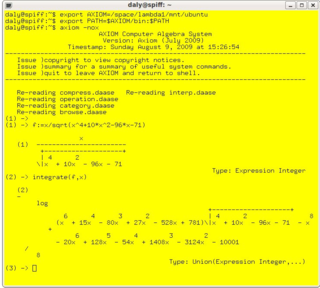A computer algebra system (CAS) or symbolic algebra system (SAS) is any mathematical software with the ability to manipulate mathematical expressions in a way similar to the traditional manual computations of mathematicians and scientists. The development of the computer algebra systems in the second half of the 20th century is part of the discipline of "computer algebra" or "symbolic computation", which has spurred work in algorithms over mathematical objects such as polynomials.
In logic and computer science, unification is an algorithmic process of solving equations between symbolic expressions. For example, using x,y,z as variables, the singleton equation set { cons(x,cons(x,nil)) = cons(2,y) } is a syntactic first-order unification problem that has the substitution { x ↦ 2, y ↦ cons(2,nil) } as its only solution.
In mathematics, an inequation is a statement that an inequality holds between two values. It is usually written in the form of a pair of expressions denoting the values in question, with a relational sign between them indicating the specific inequality relation. Some examples of inequations are:
In mathematics, computer science, and logic, rewriting covers a wide range of methods of replacing subterms of a formula with other terms. Such methods may be achieved by rewriting systems. In their most basic form, they consist of a set of objects, plus relations on how to transform those objects.
In computer science, program synthesis is the task to construct a program that provably satisfies a given high-level formal specification. In contrast to program verification, the program is to be constructed rather than given; however, both fields make use of formal proof techniques, and both comprise approaches of different degrees of automation. In contrast to automatic programming techniques, specifications in program synthesis are usually non-algorithmic statements in an appropriate logical calculus.
In theoretical computer science and formal language theory, a regular tree grammar is a formal grammar that describes a set of directed trees, or terms. A regular word grammar can be seen as a special kind of regular tree grammar, describing a set of single-path trees.
David Alan Plaisted is a computer science professor at the University of North Carolina at Chapel Hill.
Gérard Pierre Huet is a French computer scientist, linguist and mathematician. He is senior research director at INRIA and mostly known for his major and seminal contributions to type theory, programming language theory and to the theory of computation.
A solver is a piece of mathematical software, possibly in the form of a stand-alone computer program or as a software library, that 'solves' a mathematical problem. A solver takes problem descriptions in some sort of generic form and calculates their solution. In a solver, the emphasis is on creating a program or library that can easily be applied to other problems of similar type.
In mathematical logic, an uninterpreted function or function symbol is one that has no other property than its name and n-ary form. Function symbols are used, together with constants and variables, to form terms.

In mathematics and computer science, computer algebra, also called symbolic computation or algebraic computation, is a scientific area that refers to the study and development of algorithms and software for manipulating mathematical expressions and other mathematical objects. Although computer algebra could be considered a subfield of scientific computing, they are generally considered as distinct fields because scientific computing is usually based on numerical computation with approximate floating point numbers, while symbolic computation emphasizes exact computation with expressions containing variables that have no given value and are manipulated as symbols.
Jan Willem Klop is a professor of applied logic at Vrije Universiteit in Amsterdam. He holds a Ph.D. in mathematical logic from Utrecht University. Klop is known for his work on the algebra of communicating processes, co-author of TeReSe and his fixed point combinator
Anti-unification is the process of constructing a generalization common to two given symbolic expressions. As in unification, several frameworks are distinguished depending on which expressions are allowed, and which expressions are considered equal. If variables representing functions are allowed in an expression, the process is called "higher-order anti-unification", otherwise "first-order anti-unification". If the generalization is required to have an instance literally equal to each input expression, the process is called "syntactical anti-unification", otherwise "E-anti-unification", or "anti-unification modulo theory".

François Fages is a French computer scientist known for contributions in the areas of unification theory, rule-based modelling, logic programming, concurrent constraint logic programming, computational biology and systems biology.

In mathematics and theoretical computer science, a set constraint is an equation or an inequation between sets of terms. Similar to systems of (in)equations between numbers, methods are studied for solving systems of set constraints. Different approaches admit different operators on sets and different (in)equation relations between set expressions.

Jean-Pierre Jouannaud is a French computer scientist, known for his work in the area of term rewriting.
Nachum Dershowitz is an Israeli computer scientist, known e.g. for the Dershowitz–Manna ordering and the multiset path ordering used to prove termination of term rewrite systems.
Wayne Snyder is an associate professor at Boston University known for his work in E-unification theory.
Tobias Nipkow is a German computer scientist.
Deepak Kapur is a Distinguished Professor in the Department of Computer Science at the University of New Mexico.